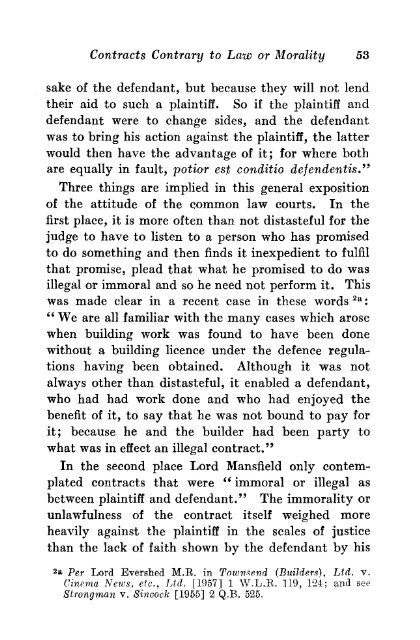The Sanctity of Contracts in English Law - College of Social ...
The Sanctity of Contracts in English Law - College of Social ...
The Sanctity of Contracts in English Law - College of Social ...
- No tags were found...
Create successful ePaper yourself
Turn your PDF publications into a flip-book with our unique Google optimized e-Paper software.
<strong>Contracts</strong> Contrary to <strong>Law</strong> or Morality 53sake <strong>of</strong> the defendant, but because they will not lendtheir aid to such a pla<strong>in</strong>tiff. So if the pla<strong>in</strong>tiff anddefendant were to change sides, and the defendantwas to br<strong>in</strong>g his action aga<strong>in</strong>st the pla<strong>in</strong>tiff, the latterwould then have the advantage <strong>of</strong> it; for where bothare equally <strong>in</strong> fault, potior est conditio defendentis."Three th<strong>in</strong>gs are implied <strong>in</strong> this general exposition<strong>of</strong> the attitude <strong>of</strong> the common law courts. In thefirst place, it is more <strong>of</strong>ten than not distasteful for thejudge to have to listen to a person who has promisedto do someth<strong>in</strong>g and then f<strong>in</strong>ds it <strong>in</strong>expedient to fulfilthat promise, plead that what he promised to do wasillegal or immoral and so he need not perform it. Thiswas made clear <strong>in</strong> a recent case <strong>in</strong> these words 2a :" We are all familiar with the many cases which arosewhen build<strong>in</strong>g work was found to have been donewithout a build<strong>in</strong>g licence under the defence regulationshav<strong>in</strong>g been obta<strong>in</strong>ed. Although it was notalways other than distasteful, it enabled a defendant,who had had work done and who had enjoyed thebenefit <strong>of</strong> it, to say that he was not bound to pay forit; because he and the builder had been party towhat was <strong>in</strong> effect an illegal contract."In the second place Lord Mansfield only contemplatedcontracts that were " immoral or illegal asbetween pla<strong>in</strong>tiff and defendant." <strong>The</strong> immorality orunlawfulness <strong>of</strong> the contract itself weighed moreheavily aga<strong>in</strong>st the pla<strong>in</strong>tiff <strong>in</strong> the scales <strong>of</strong> justicethan the lack <strong>of</strong> faith shown by the defendant by his2 » Per Lord Evershed M.E. <strong>in</strong> Town-iend (Builders), Ltd. v.C<strong>in</strong>ema News, etc., Ltd. [1957] 1 W.L..E. 119, 124; and seeStrongman v. S<strong>in</strong>cock [1955] 2 Q.B. 525.
















